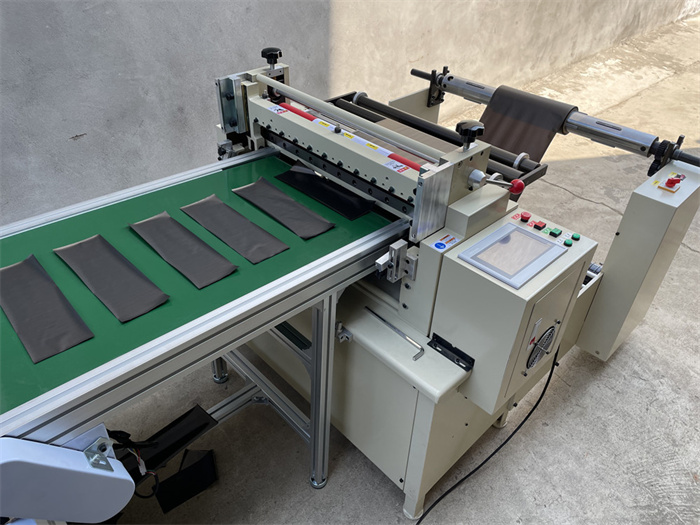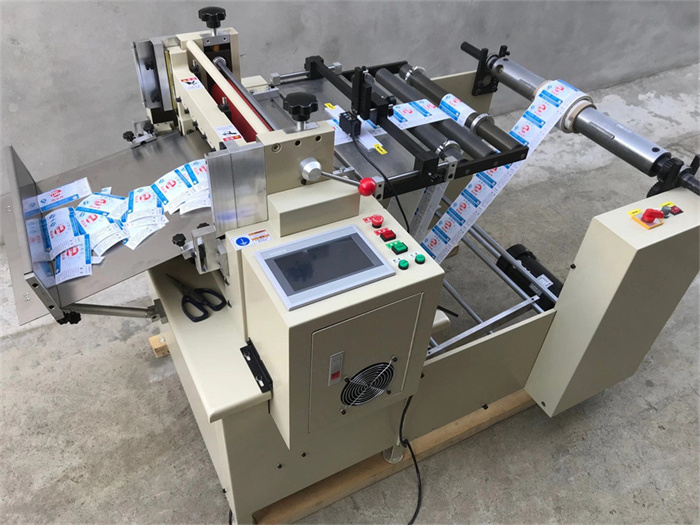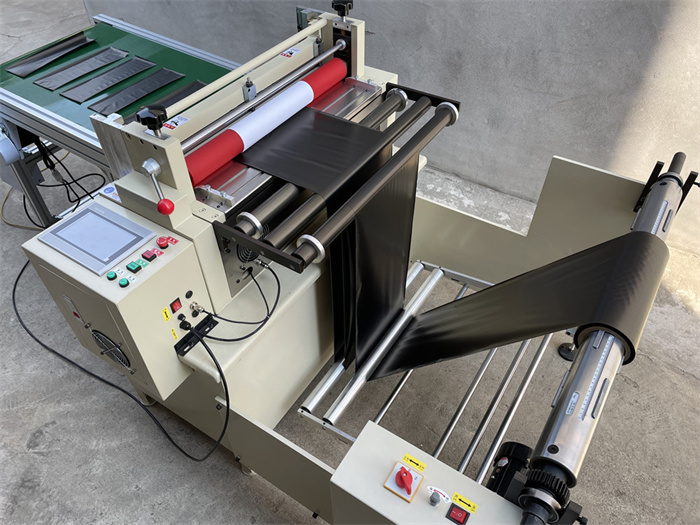In the world of industrial manufacturing, precise and efficient cutting tools are essential for ensuring production processes run smoothly. One such tool is the Roll To Sheet Cutter—an indispensable piece of machinery for businesses that deal with rolls of material that need to be cut into sheets. Whether you're cutting paper, plastic films, aluminum foil, or any other roll-based material, selecting the right cutter can significantly impact the quality and efficiency of your operation.
This article will guide you through the process of choosing the best Roll To Sheet Cutter for your specific needs. We'll explore essential features, key factors to consider, and provide answers to frequently asked questions to ensure you're well-equipped to make an informed decision.
What is a Roll To Sheet Cutter?
A Roll To Sheet Cutter is a specialized machine used to convert large rolls of material into smaller sheets of predefined sizes. These machines are vital in various industries such as paper manufacturing, packaging, electronics, and textiles. The primary function of a Roll To Sheet Cutter is to slice materials—like paper, plastic film, aluminum foil, and other non-metallic materials—into precise sheets based on length and width specifications.
Types of Materials Processed by Roll To Sheet Cutters
Depending on your industry and production needs, the Roll To Sheet Cutter can handle a wide range of materials. Common examples include:
Paper: For the printing and packaging industries.
Plastic Films: Used in packaging, such as BOPP or PE films.
Aluminum Foil: For packaging and insulation purposes.
Non-Metallic Foils: Including copper, PET, and FPC.
Textile and Fabrics: Cutting fabric rolls for various applications.



Key Features of a Roll To Sheet Cutter
When choosing the right Roll To Sheet Cutter, it's crucial to evaluate several key features that will ensure optimal performance. Here are the essential components you need to consider:
1. Cutting Precision
The cutting precision of a Roll To Sheet Cutter determines how accurately the machine can slice materials. Precision is crucial for ensuring that each sheet meets the required dimensions without waste. A cutting precision of 0.03mm is standard in high-quality machines, making them suitable for industries where tight tolerances are needed.
2. Cutting Speed
The cutting speed of the machine will depend on the material you're processing and the required output. Modern Roll To Sheet Cutters typically offer speeds of 100 cuts per minute, making them highly efficient for high-volume production. Ensure that the cutting speed aligns with your production requirements to optimize productivity.
3. Material Thickness Compatibility
Different materials have different thicknesses, and your Roll To Sheet Cutter needs to accommodate a range of thicknesses. High-quality machines can typically handle materials between 0.5mm and 20mm. If you're working with thicker materials, ensure the cutter's specifications meet those needs.
4. Automation and Control Features
Modern Roll To Sheet Cutters come equipped with advanced automation systems. These include PLC controllers for easy programming of cutting lengths, batch quantities, and cutting speeds. You should look for machines with user-friendly interfaces, like touch screens, that allow easy configuration and monitoring of cutting operations.
Additionally, consider machines that come with optional features such as automatic unwinding systems, servo motors, and eye mark devices for precise cutting of printed or labeled materials.
5. Versatility
If your production involves a variety of materials, selecting a versatile Roll To Sheet Cutter is essential. Machines that can handle multiple materials like paper, plastic, foil, and fabrics offer increased flexibility. Look for cutters that offer adjustable settings for different materials and thicknesses, ensuring you can tackle a broad range of cutting tasks.
6. Safety Features
Safety is a critical aspect of any industrial machine. A reliable Roll To Sheet Cutter should have safety features such as enclosed blades, emergency stop buttons, and guardrails to protect operators from accidents. Always verify the safety measures before making a purchase.
How to Choose the Right Roll To Sheet Cutter?
Choosing the right Roll To Sheet Cutter involves understanding your production requirements and matching them with the features offered by different machines. Here are the steps you can follow to make the best decision:
Step 1: Identify Your Material Types and Specifications
Begin by analyzing the materials you'll be cutting. Whether you're working with paper, plastic film, aluminum foil, or another material, it's essential to understand the material's properties, including its thickness, width, and cutting precision needs. This information will guide you in choosing a cutter that can handle your materials efficiently.
Step 2: Determine Required Cutting Dimensions
Understand the length and width specifications for the sheets you need. Most Roll To Sheet Cutters allow customization of the cutting length, typically ranging from 0 to 9999.99mm. Ensure the machine you choose can handle the specific dimensions required for your production process.
Step 3: Consider Your Production Volume
If your production requires high-speed cutting, choose a machine that offers high cutting speeds and efficient material handling features. A machine capable of cutting 100 cuts per minute may be sufficient for medium-volume production, but higher volumes may require advanced automation features to maintain efficiency.
Step 4: Evaluate Automation and Control Features
Look for Roll To Sheet Cutters with advanced automation features such as PLC control systems, servo motors, and automatic unwinding systems. These features improve the efficiency of the cutting process and reduce the need for manual intervention.
Step 5: Assess Safety and Maintenance
Make sure the Roll To Sheet Cutter you choose has comprehensive safety features to protect operators during operation. Regular maintenance is also necessary for the machine's longevity. Consider machines that offer easy-to-replace parts like cutting blades and come with extended warranties for peace of mind.
Step 6: Review Machine Specifications and Parameters
When reviewing machine specifications, consider factors such as cutting precision, material thickness, power requirements, and overall machine size. Ensure that the machine’s specs match your production needs and fit within your production floor's space constraints.
FAQs
What materials can a Roll To Sheet Cutter handle?
A Roll To Sheet Cutter can handle a wide range of materials, including paper, plastic films, aluminum foil, fabric, copper foil, PET, PC, PVC, and various adhesive materials. Ensure that the machine you choose is compatible with the material you plan to cut.
What cutting precision should I look for?
For most industrial applications, a cutting precision of 0.03mm is ideal. This level of precision ensures that your sheets are consistently cut to the desired size with minimal waste.
How fast can a Roll To Sheet Cutter operate?
Cutting speeds for Roll To Sheet Cutters typically range from 100 cuts per minute, but the speed can vary based on the material and thickness. Ensure that the cutter you select can keep up with your production requirements.
What are some key features to look for in a Roll To Sheet Cutter?
Look for Roll To Sheet Cutters that offer:
High cutting precision (0.03mm)
Flexible material compatibility
Easy-to-use controls (touch screens)
Automatic unwinding systems
Safety features like blade guards and emergency stops
How do I maintain my Roll To Sheet Cutter?
Regular maintenance is necessary to ensure the longevity and efficiency of the Roll To Sheet Cutter. This includes blade replacement, cleaning, and lubrication. Make sure to follow the manufacturer's recommended maintenance schedule and inspect the machine periodically for wear and tear.
Conclusion
Selecting the right Roll To Sheet Cutter is crucial for optimizing your production process. By considering the material type, cutting precision, speed, and automation features, you can find the machine that best meets your needs. With the right cutter, you can improve productivity, reduce waste, and enhance the overall quality of your output.
At Yancheng Longterm Machinery Co., Ltd, we provide a range of advanced Roll To Sheet Cutters that cater to various industries. Whether you are cutting paper, plastic films, or aluminum foil, our machines offer precision, efficiency, and reliability. Feel free to contact us for more information or assistance in selecting the right cutting machine for your business.















